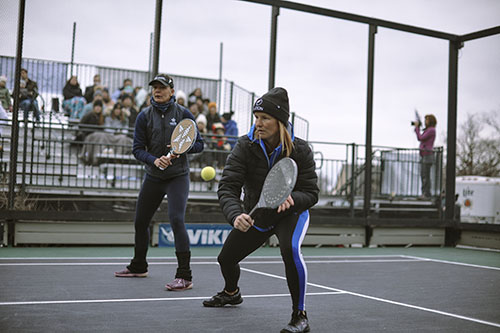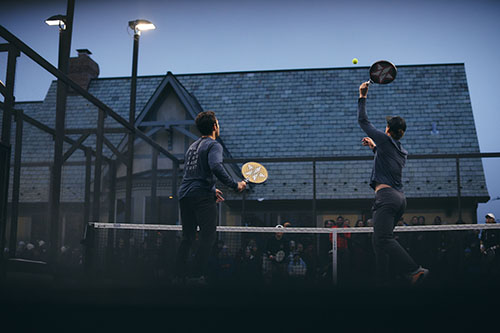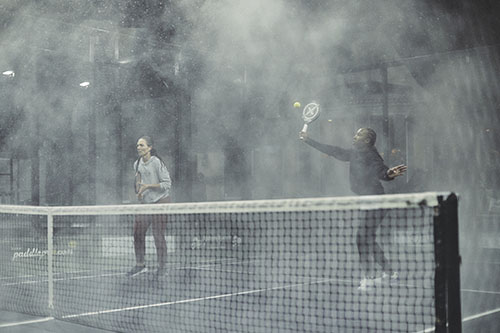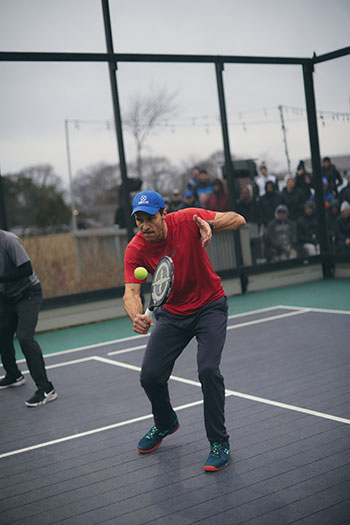Thinking Like A Pro - How Scoring Is an Illusion
April 20, 2023
Coaches Corner
By Oliver Jones
Oliver teaches paddle and tennis at The Overbrook Golf Club in Villanova, PA. He holds a 7.2 PTI and competes nationally on the APTA tournament circuit.
In this series Thinking Like a Pro, we are contrasting the mental approach of the professional paddle player to that of the amateur or recreational club player. (If you want to dip your toes into what the pros are doing and make the move from standard to great, these articles can help to get you there.) By highlighting the differences, we will begin to get a clear view of a pro’s thought process. A mindset that allows him/her to advance his/her physical and mental limits and edge closer to his/her full potential. While we will be thinking within a platform tennis context, these concepts emphasize underlying mental models for learning, and thus undoubtedly apply in all areas of life in which we seek true mastery. Each article in the series will examine one specific area; in this seventh article, we are looking at how scoring is an illusion.

We’ve All Been There…
We come off the court after a 6-0, 6-0 loss (or any blowout match) feeling frustrated and despondent; thinking how terribly we played, how thoroughly we just got smoked, and how it would take a small miracle to have a chance in that match. Because on the scoreboard that’s exactly how it looks.
But scoring in paddle (and tennis), can be incredibly misleading due to the structure of the scoring system. All true professionals understand this dynamic and use it to their advantage.
We are going to break down the mathematics so that
- You will be able to see through the labyrinth of the scoring system to reveal it for what it is.
- You will see with clarity and transparency that the scores in your paddle matches might not be as reflective of reality as they appear.
Armed with this knowledge, you too will be able to understand and break down match scores like the pros.

Scoring Basics
In paddle, the scoring system is not simply ‘First to 48 points,’ the minimum number of points it takes to win two sets (24 plus 24). It is instead broken down into games and sets.
It takes four points to win a game, at which point we start all over again and have to win another four points (minimum) to win another game. A set is won when one team gets to six games (winning by two), and it takes two sets to win the match.
The fact that we don't score first to 48 points is significant because, at the end of each game, we essentially start all over again at 0-0 in points until another game is won. If we were to score first to 48, the points we had won in previous games would not only carry over into the next game but hold their worth the entire match.
In paddle, once a game is won, the points we won or lost in that game are essentially worthless. For an easy example, we could have won 15 points in one game, yet if our opponent ultimately wins that game, we might as well have lost it at love. This is the same when it comes to a set. Whether we lost a set closely at 6-7 or a blowout at 0-6, it doesn't matter to the scoreboard because they are both ultimately one set to zero.

Fresh Start
This means we essentially get a fresh start at the end of every game and at the end of every set. We have to rebuild again from the beginning at each of these stages. This is important to recognize because it begins to demystify the incredulity of players when they come to the hut saying, “I can’t believe I lost that match. I was up 6-0, 5-2!”
We have to understand that being up a set 6-0 and 5-2 is not the same as 44-8 in points (if we were scoring first to 48 points style). A 44-8 in points is a much greater lead because all our previous points have stayed with us and carried over. At 6-0, 5-2 in games, we have to start all over for the upcoming game 0-0. If we lose that game and it’s 5-3, guess what, we start again 0-0. And if we lose the set, we essentially start the match from the beginning,1-1 in sets on the scoreboard. How quickly things can change!
So, we can start to see how the scoring system is very misleading. A 6-0, 5-2 lead doesn't seem so safe after all, and losing that match, while still improbable, doesn’t seem so unreasonable.
Every game is a fresh start in paddle. The scoring system doesn’t care how we got there, only that someone won or lost the game. A new game is a new start 0-0, and professionals use this knowledge to their advantage whether they be up or down. When top players are up, they know that there is no time to rest on their laurels, get complacent, or think, “Oh, I can take a few points off because I won the first three games.”
This type of thinking is exactly what the inexperienced tend to think because they don't recognize that taking a couple of points off could get them right back to 3-2, due to the nature of the scoring system, and all of a sudden, they are in a dog fight instead of a well-managed first set head start to the match.
The professional centers himself and re-commits to the task at hand at the start of each game no matter the lead. The professional uses this same scoring mechanism to his advantage when he is down. Because he has a deep understanding of how close matches can be despite how it may appear on the scoreboard, he knows that an inexperienced opponent, resting on the perceived safety of a 5-2 lead, is easy prey. The pros can count on the inexperienced players taking it easy, taking their foot off the gas, getting sloppy through complacency, and letting them back into the set.

Do The Math
To take it even deeper, let’s dive into more mathematics and break down points within a game and see what we find. Take six individual points played in a game:
If you are losing four points, and winning two on a consistent basis, you will lose the match 6-0, 6-0. Within each game, while you are doing well enough to win two points, you cannot string enough together to win a game and will have to start again at the beginning of each subsequent game.
But, if you could get one point better and lose only three points and win three points on a consistent basis out of the six total points, this would completely change the dynamic of the match. You would be competing and challenging for every game, theoretically going to deuce every time, and radically changing the playing conditions of the match. Who knows how your opponents would respond to this kind of added scoreboard pressure where the margin for error has been drastically transformed.
Being one point better is only a 17% improvement (1 divided by 6).
That’s a 17% difference to get from a 6-0, 6-0 blowout to a battle on even terms.
Sure, you might still lose the match, but the tension of a close battle is where the learning is, so even if you lose, you are now competing and can extract considerable value from the match experience.
Professionals understand that this scoring dynamic, however, is a double-edged sword. Just as you should feel confident in your ability to regroup and find that 17% in the second set after a blowout, you should be aware that, should you be the one to blow out the opponents, they are potentially only 17% from getting right back into the match.

Of course, this example is based on knowing you are at getting at least two points per game, so it won’t be applicable for those straight sets losses where you aren't even getting a point. But the concept serves to highlight the simple idea that the score is not reflective of the closeness of the match and can give a false impression of reality.
The takeaway is that scoring can be illusory due to the mechanism by which it is measured. The professional can see through this opaque reflection of reality and see the situation for what it is, regardless of being up or down. This objective assessment of the situation is what gives them a massive advantage over the less experienced.
Armed with this knowledge, now you too can more objectively evaluate the situation like a professional and further optimize your play today and for the future.
NOTE: The “Thinking Like a Pro” articles are excerpts from Oliver Jones’ new book Paddle Principles: A Beginner to Advanced Guide to Winning Paddle. If you would like to purchase it, contact the author directly at o.d.j.jones@gmail.com
Photo Credit: @garrisonblock







